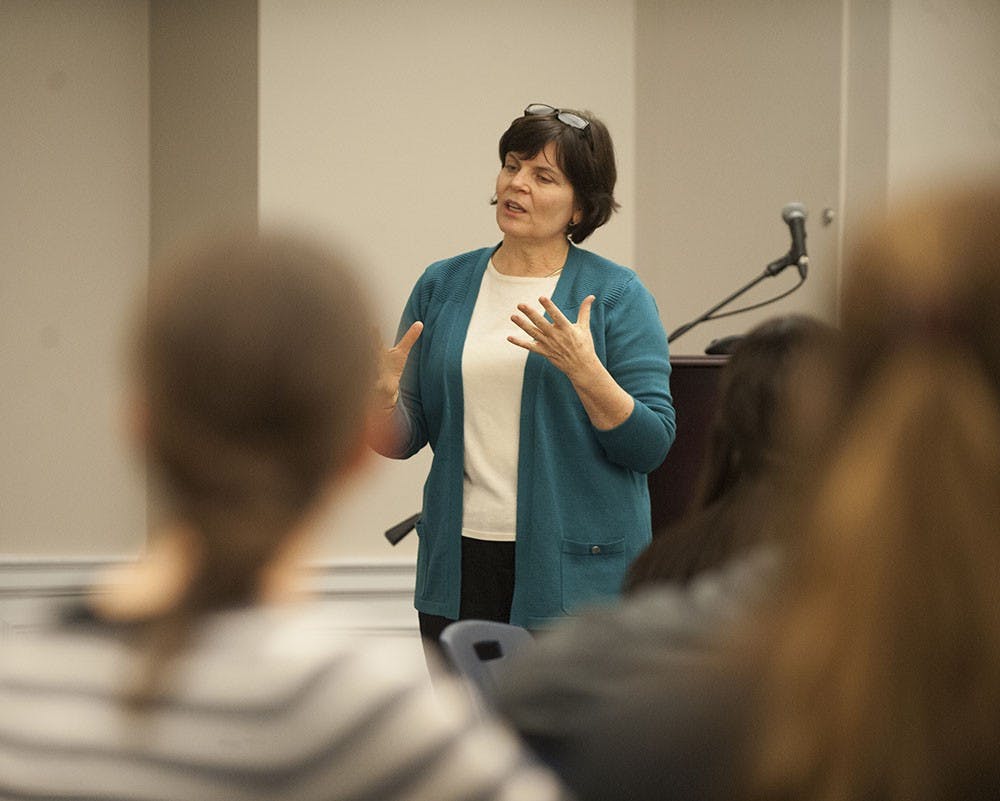The Undergraduate Research Network hosted the first installment of a new dinner series Tuesday night in Newcomb Hall.
The Undergraduate Research Network, or URN, is a student-run organization which works to engage undergraduate students in research opportunities. Fourth-year College student Nick Lee serves as chair of the Undergraduate Research Network.
“[There is] a lot of education and trying to connect students to research opportunities, along with trying to get students to know other students conducting research,” Lee said.
The dinner featured two speakers: Barbara Mann, an associate professor of internal medicine in the microbiology department, and William Sherman, a professor of architecture and associate vice president for research. Sherman is also a founder of OpenGrounds, which promotes collaborative research across disciplines in the University.
Mann opened with a discussion of problems faced by research facilities, particularly those with a biosafety level of three or four that work with dangerous and infectious diseases.
“One of the issues is how [to] balance keeping people safe and still trying to conduct research which is necessary to learn how to deal with these [biological] agents,” Mann said.
Mann discussed the issue of biological terrorists and criminals, such as Bruce Ivins, a laboratory worker with the United States Army Medical Research Institute of Infectious Diseases who sent letters containing anthrax in the U.S. Mail in 2001.
“He had a lot of mental issues, and he went through an evaluation every single year, but no one asked him about his mental status,” Mann said. “How do we protect ourselves from people who are mentally unstable? That’s another thing you need to think about when you’re conducting research.”
Sherman focused on the development of interdisciplinary research and collaboration across disciplines.
“Most of our disciplines were formed and defined in the 19th century and now we see the really exciting stuff is happening at the joints between disciplines,” Sherman said.
As an institution with a variety of disciplines and an increasing number of interdisciplinary fields, the University is in an opportune position for collaboration, Sherman said.
“It’s the lateral pathways through the University that create a kind of ecosystem that allows new ideas and creates the opportunities for invention,” Sherman said. “You don’t get the same level of diversity outside of the University; to not take advantage of that is a real loss of opportunity.”
The dinner was offered to involved students as a means to connect them to other students already involved in research.
“That’s something that’s pretty lacking,” Lee said. “Often times students are pretty cloistered in their own research, so it’s really to connect those people together.”
Organizations such as TedxUVa and Student Council are also involved in supporting undergraduate research. Lee said he hopes other supporting groups will offer an additional source of collaboration.
“All these other organizations can help support each other [by] disseminating this idea of research,” Lee said. “So this is kind of a way that students can start brainstorming ideas.”
Lee said the dinner series is a good opportunity for students to begin discussions about future projects and collaboration across disciplines.
“It’s really an inspirational talk to kickstart the discussion of students representing their organizations and how they can work together in the future,” Lee said.
URN offers a number of additional resources to undergraduate students interested in research, from undergraduate and graduate mentors to socials with professors and workshops teaching students about getting involved in research.
“We run through the steps of how to evaluate professors that you might want to work with, how you contact them, and how you might want to conduct yourself in an interview with them,” Lee said. “We have the whole gambit of options for students to be able to get the information they need.”
Though there are other institutions around Grounds that offer similar opportunities to undergraduate students, they are often associated with a particular department.
“I would say it’s the only centralized way to do it,” Lee said. “There are some individual departments, like the biomedical engineering department, that offer a shadowing program, but for the most part there is no real localized source of information about research opportunities around Grounds.”
Sherman emphasized the importance of student initiative when considering research options in any field.
“The best advice that I could give every student is to go to your professor’s office hours,” Sherman said. “They’ll get to know you, remember you, and they’ll be looking out for you.”







